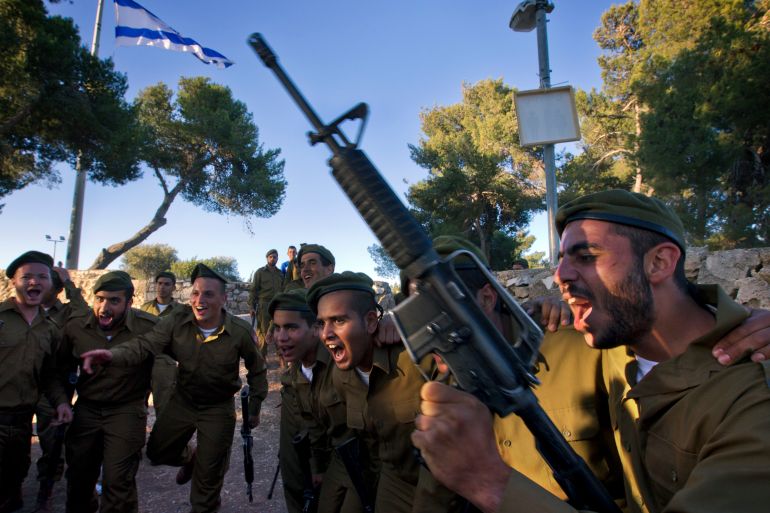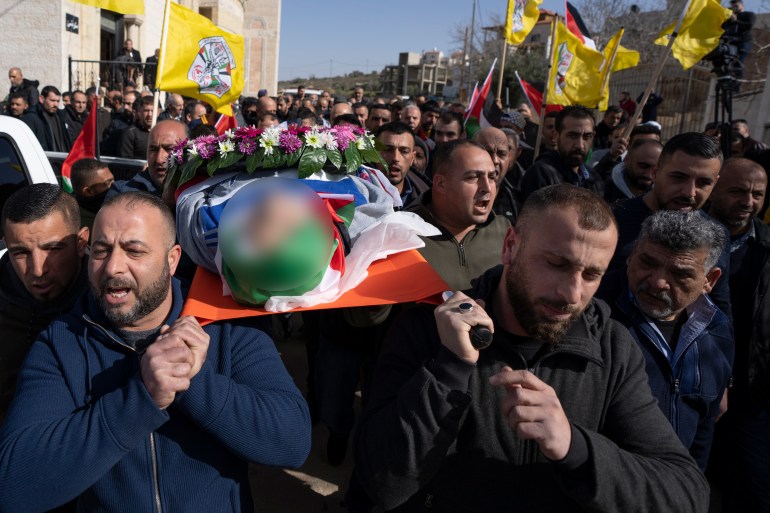What is Netzah Yehuda, the Israeli battalion facing possible US sanctions?
Washington is considering to impose sanctions on the Israeli military unit accused of rights abuse against Palestinians.

The United States is considering imposing sanctions on the Israeli battalion, Netzah Yehuda, an all-male ultra-Orthodox battalion unit accused of human rights violations during its operations in the occupied West Bank, according to US media reports.
The New York Times, quoting an unnamed source, reported that one or more Israeli battalions might be affected by the sanctions. But Israeli media reported on Wednesday that Washington may not go ahead with the sanctions due to pressure from Israeli leaders. Al Jazeera however, could not independently verify the media reports.
Keep reading
list of 4 itemsWhy has the flooding in Kenya been so devastating?
UK has begun mass arrests of potential Rwanda deportees: What’s next?
Why are Pakistan’s wheat farmers protesting against the government?
The reports of possible sanctions came a day after the US Congress approved $26bn aid for Israel, which has continued its assault on Gaza, killing more than 34,000 people and rendering the enclave of 2.3 million unlivable.
The US had put pressure on Israel to investigate the death of Omar Assad, a Palestinian American who died during his arrest by soldiers from the Netzah Yehuda battalion in January 2022.
In October 2022, Israel agreed to pay compensation to the family of the 80-year-old man in a rare move. In June last year, however, Israel said its forces would not be charged for Assad’s death and instead imposed disciplinary measures.
What has been the Israeli response?
Israeli Prime Minister Benjamin Netanyahu declared his support for the controversial battalion, which has been accused of abuses in the past. In October 2021, four soldiers from Netzah Yehuda were arrested for allegedly beating and sexually assaulting a Palestinian suspect, while a soldier from the unit was indicted for electrocuting detainees in 2015.
“If anyone thinks they can impose sanctions on a unit of the [Israeli army] – I will fight it with all my strength,” Netanyahu declared.
Benny Gantz, war cabinet minister, also expressed his opinion against the potential sanctions.
“I have a great appreciation for our American friends, but the decision to impose sanctions” on an Israeli army unit and its soldiers “sets a dangerous precedent and conveys the wrong message to our shared enemies during war time”, Gantz, a former army chief, posted on X.
What is Netzah Yehuda battalion and where does it operate?
Netzah Yehuda, formerly Nahal Haredi, was established in 1999 to accommodate ultra-Orthodox or Haredi Jews, who refuse to interact with female soldiers due to their strict religious beliefs. The first unit, known as the 97th Netzah Yehuda Battalion, started with 30 soldiers. The battalion has more than 1,000 soldiers now and is under the Israeli army’s Kfir Brigade.
The primary area of combat for the battalion is in the occupied West Bank. But recently, the Israeli military ordered the deployment of the battalion in north Gaza’s Beit Hanoon district.
What’s Leahy law under which the Israeli battalion is being sanctioned?
The law is named after former Vermont Senator Patrick Leahy, who introduced a legislative measure in the 1990s. The Leahy law, enacted in 1997, requires the US to cut aid to a foreign military accused of credible charges of human rights violations.
The law “prohibits the Department of State (State) and the Department of Defense (DoD) from providing funds for assistance or training to foreign security force units or individuals where there is credible information that these forces have committed a gross violation of human rights (GVHR)”. Examples of rights violations include torture, extrajudicial killing, enforced disappearance, or rape.

How will it affect the Israeli army amid accusations of war crimes in Gaza?
If the US Department of State determines that Netzah Yehuda soldiers committed GVHRs, it would be prohibited by US law to provide further military assistance to certain individuals or units in the Israeli military.
Last week, Secretary of State Antony Blinken told reporters: “When we’re doing these investigations these inquiries it’s something that takes time that has to be done very carefully, both in collecting the facts and analysing them, and that’s exactly what we’ve done. And I think it’s fair to say that you’ll see results very soon. I’ve made determinations you can expect to see them in the days ahead.”
While we wait for Blinken’s final assessment, violation of the Leahy law could potentially block some of the $3.8bn military aid the US sends to Israel every year. The Leahy law does not require the aid to be blocked entirely, just some related to the offending unit.
The move will not affect the billions in military aid cleared by the US Congress earlier this week.
However, Blinken failed to act on recommendations by a State Department forum to sanction Israeli units accused of human rights violations, according to a report by the US portal ProPublica last week.
In addition to the State Department’s call for probe into the death of the Palestinian American, Assad, Democracy Now for the Arab World (DAWN), an advocacy group helping to promote democracy and human rights in the Middle East and North Africa, submitted an article in November 2022 to the Office of the Prosecutor of the International Criminal Court in relation to the abuses committed by the battalion.
It stated: “Between 2015 and 2022, the battalion has been involved in a number of grave incidents involving abuses of Palestinian civilians, including shooting and killing unarmed civilians, torture, physical assault, beating, and sexual assault, in violation of international human rights law and international humanitarian law. During this period, soldiers from the unit killed three Palestinians – Iyad Zakariya Hamed (38), Qassem Abbasi (16) and Palestinian-American Omar Assad (78) – in incidents in which soldiers used lethal force against unarmed civilians without justification. In almost every case (as documented below), soldiers were found to be lying or covering up the incidents to suggest that they were acting in self-defense.”
What other militaries have been sanctioned in the past by the US?
If the US goes ahead, it would be the first time Washington would be sanctioning the Israeli military.
Although most details of cases when the Leahy law is invoked are classified, a recent unclassified document by the State Department lists countries such as Azerbaijan, Kyrgyzstan, Mexico and the Caribbean nation of Saint Lucia that triggered the Leahy law.
In some other instances, the US can freeze or suspend transactions related to nongovernment entries which can be people, corporations or non-profit companies funneling cash to a country’s military accused of rights violations. The US does not have to always use the Leahy law to impose sanctions.
Last month, the Department of the Treasury’s Office of Foreign Assets Control (OFAC) sanctioned six individuals and two companies based in Russia, China, and the United Arab Emirates for the funding of North Korea’s military programme.
In January, the US designated four individuals and two companies responsible for the production of arms for the Myanmar military. In February 2021, Myanmar’s military seized power in a coup, which resulted in the killing of innocent civilians. The Rohingya, a Muslim ethnic minority group in Myanmar, have been the targets of the military.